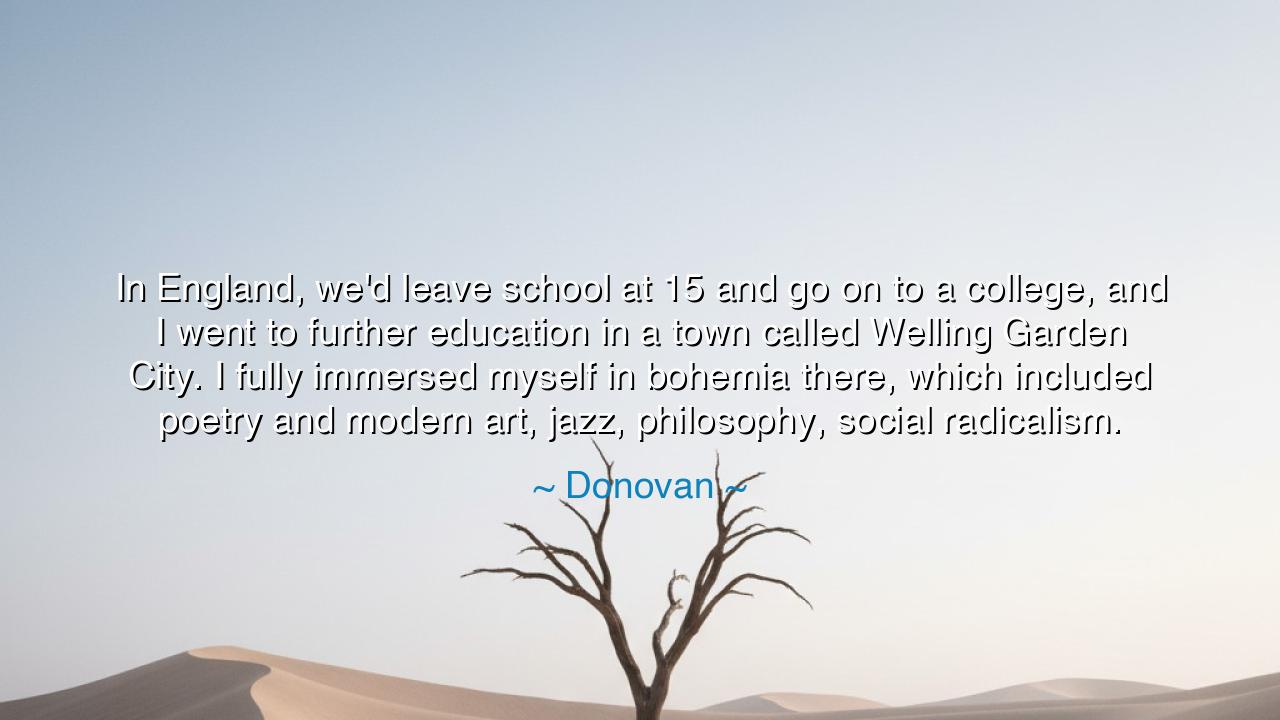
In England, we'd leave school at 15 and go on to a college, and I
In England, we'd leave school at 15 and go on to a college, and I went to further education in a town called Welling Garden City. I fully immersed myself in bohemia there, which included poetry and modern art, jazz, philosophy, social radicalism.






Hear the words of Donovan, the minstrel of a generation, who sang with both voice and memory: “In England, we’d leave school at 15 and go on to a college, and I went to further education in a town called Welling Garden City. I fully immersed myself in bohemia there, which included poetry and modern art, jazz, philosophy, social radicalism.” In this recollection lies not only the story of one man’s youth, but the eternal truth that the fire of creativity is often born in places where tradition loosens its grip, and the spirit dares to wander beyond convention.
The ancients, too, knew of such transformations. In Athens, young men left the discipline of grammar and rhetoric to seek out the company of philosophers in the groves of the Academy, where poetry and philosophy mingled, and where the boundaries of tradition were tested. In Rome, artists and thinkers gathered in hidden circles, where new ideas of freedom and expression were born. Donovan’s tale of bohemia is but the modern echo of these ancient gatherings—youthful souls rebelling against conformity, seeking truth in art, in song, and in radical thought.
In Welling Garden City, Donovan found not just a school, but a crucible. There he met voices of rebellion and beauty, where the rhythms of jazz mingled with the verses of poetry, and where the canvas of modern art mirrored the restless spirit of a generation. To “immerse” oneself in such a world was to drink deeply from the streams of imagination, to live as though every thought and sound might become a new revelation. It was not education in the narrow sense of lectures and exams, but in the broader sense of awakening—the kind of awakening that fuels revolutions of spirit.
History gives us many examples of such awakenings. In Paris, at the turn of the twentieth century, painters like Picasso, poets like Apollinaire, and musicians of strange new forms gathered in cafés and studios. Out of their bohemia came Cubism, Surrealism, and Jazz Age rhythms that reshaped the world of art. These movements did not grow from official institutions but from those who dared to gather, to question, to live freely. Donovan’s journey in England was a continuation of this eternal tradition: the young seeking to break open the shell of tradition and breathe new life into culture.
But Donovan’s words also carry a deeper reflection. He speaks of leaving school at fifteen, a reminder that formal paths are not the only ones that lead to wisdom. Many of history’s most profound voices—poets, artists, prophets—were not confined by the walls of structured education. Their college was the world itself, their teachers the artists and radicals who challenged them, their curriculum the free exchange of ideas in cafés, studios, and late-night conversations.
The lesson for us, O listener, is this: do not despise the unconventional paths of learning. Seek out places and people who stir your imagination. Read poetry, listen to jazz, study philosophy, and engage with those who challenge the old ways. Allow yourself to be “immersed” in the currents of creativity and thought, for it is there that new visions are born. Formal schooling may teach discipline, but bohemia teaches freedom, and both are needed for the fullness of wisdom.
Thus let Donovan’s words endure as a torch for all who yearn for more than mere conformity: life’s greatest education may come not from classrooms alone, but from the fire of bohemia—from art, music, radical thought, and the courage to live differently. Immerse yourself in these waters, and you too may discover the vision to change not only yourself, but the culture of your time.






AAdministratorAdministrator
Welcome, honored guests. Please leave a comment, we will respond soon